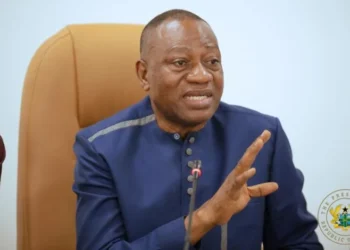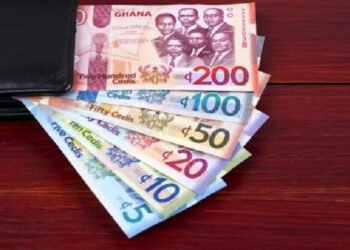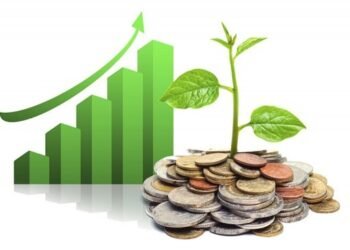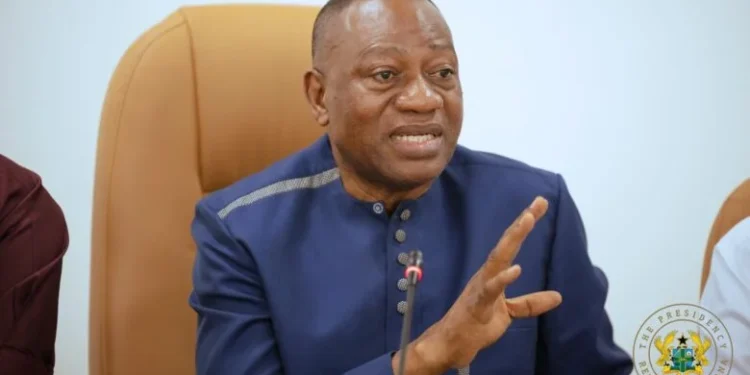Ghana’s local currency, the cedi, has been on a remarkable appreciation trajectory in 2025, registering a 40.7% gain against the US dollar in just the first seven months of the year.
Backed by solid macroeconomic fundamentals and a surge in international reserves, the cedi is showing its strongest performance in years. However, UK-based research firm Fitch Solutions has sounded a cautious note—warning that the currency’s continued strength hinges precariously on one critical factor: gold prices.
According to the July 2025 Summary of Economic and Financial Data released by the Bank of Ghana, the cedi appreciated by 43% in May, 42.6% in June, and 40.7% overall against the US dollar by the end of July. The local currency currently trades at GH¢10.45 to the dollar on the interbank market, while retail market rates hover around GH¢12. Against other major currencies, the cedi is also performing impressively—gaining 24.2% to the euro and 31.2% to the pound sterling.
This rally is a dramatic turnaround from previous years of volatility and depreciation. Analysts have largely credited the cedi’s resilience to strong fiscal management, increased foreign exchange inflows from the cocoa and gold sectors, and most importantly, the Bank of Ghana’s solid international reserves, currently standing at US$7.9 billion.
Fitch Cautions
While Fitch Solutions has acknowledged the strength of the cedi and projects that its gains will hold through 2025 and 2026, it has introduced an important caveat in its latest report titled “What Our Clients Want to Know: Sub-Saharan Africa Q3 2025 Macroeconomic Update.” According to the firm, the cedi’s continued momentum is highly dependent on gold prices remaining high.
“A hypothetical decline in gold prices, which could potentially be triggered by a sudden easing of geopolitical tensions, would quickly erode Ghana’s export earnings, push the current account back into deficit, and undermine reserve adequacy.”
Fitch Solutions
Ghana is Africa’s top gold producer, and gold exports form a significant portion of the country’s foreign exchange earnings. As such, elevated gold prices have played a critical role in boosting the country’s trade surplus, improving its balance of payments, and strengthening the cedi.
Fitch notes that the current wave of high gold prices—largely fueled by geopolitical uncertainties and inflation hedging—has enabled the Bank of Ghana to shore up its reserves and keep the cedi on a firm footing. But this success story could quickly unravel if global tensions ease and gold prices fall.
“In such a scenario, the central bank would struggle to defend the cedi and would likely be forced to let the currency weaken,” Fitch warned, highlighting how a decline in gold revenues would make defending the exchange rate a costly and unsustainable exercise.
Can the Cedi Survive a Gold Price Crash?
The big question now facing policymakers is how well prepared Ghana is for a reversal in gold prices. With the cedi’s recent appreciation tightly tied to gold windfalls, any sudden downturn could expose the structural vulnerabilities in the economy. Already, Fitch’s scenario analysis points to a potential return to current account deficits and dwindling reserves should gold prices dip significantly.
Economists argue that diversification is the long-term solution. Overreliance on gold and cocoa for foreign earnings is a known risk. While the current cedi performance is encouraging, Ghana must continue pushing for diversified exports and foreign investment inflows.
For now, the cedi’s stellar performance provides breathing space for the government and the central bank. Importers, debt service planners, and consumers are enjoying the benefits of a stronger local currency—lower import costs, stabilized fuel prices, and easing inflation.
READ ALSO: Don’t Expect Cheaper Loans Despite BoG’s Rate Cut- Economist Dampens Hopes























